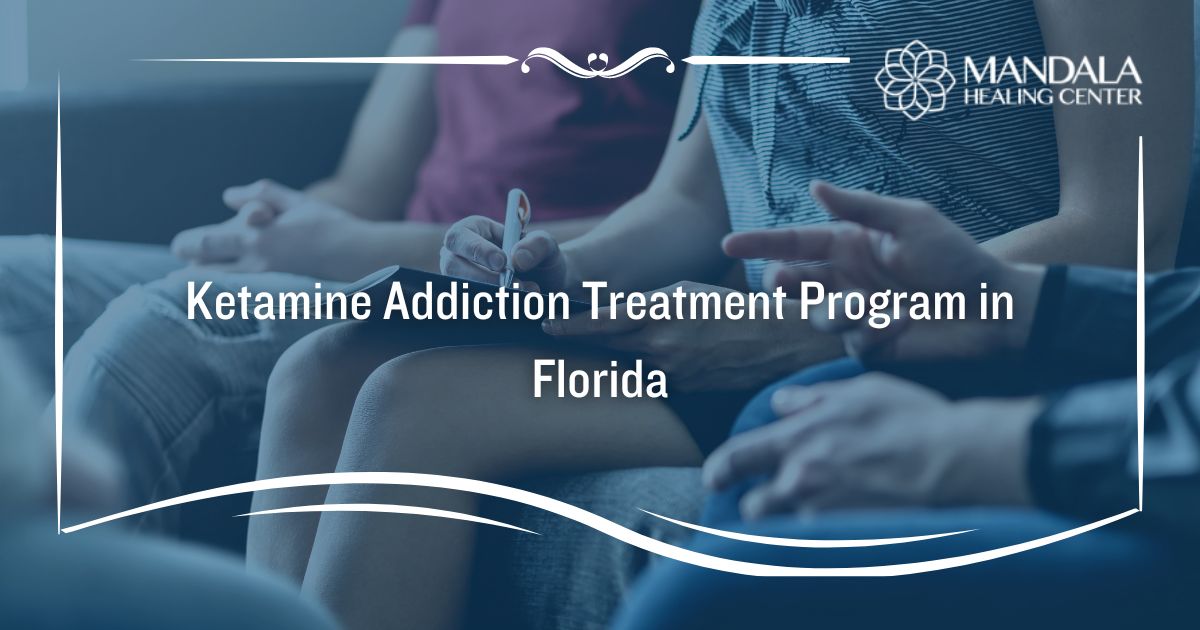The Substance Abuse and Mental Health Services Administration (SAMHSA) reports that 7.4 million people abused hallucinogenic drugs in 2021.[1]
While most people think of acid or mushrooms when they hear hallucinogenic drugs, there are others to be aware of. Experts classify ketamine as a hallucinogen despite its dissociative effects.
Ketamine is an anesthetic in humans and animals. It also manages mental health disorders like treatment-resistant depression in small doses.
When abused, it can cause symptoms like distortions in sensory perception and a detachment from reality. Most people who misuse the drug are active in party and rave scenes.
People who misuse ketamine are at risk of developing an addiction. Ketamine addiction can be challenging to overcome. However, addiction treatment centers in Florida can offer the tools and support you need to achieve sobriety.
During a ketamine drug rehab center in Florida, you will participate in an initial assessment and medical detox. You will also engage in evidence-based therapies, relapse prevention planning, and aftercare services.
What are the Effects of Ketamine Abuse?
People use ketamine to experience out-of-body sensations. Ketamine comes in powder or liquid form. Individuals might smoke, snort, or mix ketamine into a drink.
The common effects of ketamine abuse include:[2]
- Feelings of relaxation or calmness
- Distortions of sight and sound
- Rigidness of the body
- Pain relief
- Amnesia
- Dissociative sensations
- Hallucinations
- Dilated pupils
Repeatedly using ketamine will lead to dependency and tolerance. In other words, you will develop an addiction. Ketamine addiction can lead to a variety of adverse health effects, including risks of life-threatening overdoses.
What are the Signs of Ketamine Addiction?
Being addicted to ketamine means you cannot control how much of the substance you use. You will also experience hard-to-manage cravings when you are not on ketamine. A substance use disorder can also cause all of the essential things in your life to take a backseat.
The main signs of ketamine addiction include:
- Using more ketamine than you intended to
- Wanting to cut down on ketamine use but being unsuccessful
- Experiencing cravings to consume ketamine
- Losing interest in previously enjoyed activities to abuse ketamine more often
- Failing to meet responsibilities at work, school, or home because of ketamine misuse
- Dealing with social issues because of ketamine use
- Continuing to use ketamine despite experiencing adverse mental or physical health effects
- Needing to increase the dose of ketamine to experience the desired effect
- Experiencing withdrawal symptoms when you cannot use ketamine
If you or a loved one are addicted to ketamine, residential treatment can help you achieve long-term recovery.
How Does Treatment for Ketamine Addiction in Florida Work?
The specific treatment services you receive will depend on your chosen rehab program. For example, inpatient rehab is a little bit different than outpatient treatment. However, most people choose inpatient treatment when recovering from ketamine addiction.
During ketamine addiction treatment in Florida, you can expect the following services:
Assessment
Upon arrival at a ketamine rehab program, you will begin an initial assessment. The medical staff will gather information about your physical and mental health. Additionally, they will ask questions about your history of ketamine abuse. The therapists and doctors use this information to create a treatment plan based on your needs.
Medical Detox
Once we create your treatment plan, we begin ketamine detox. Ketamine addiction leads to withdrawal symptoms once you stop abusing the substance. You might experience symptoms like mood swings, nausea, heart palpitations, and cravings.
Thankfully, medical detox programs offer medications to limit these symptoms. As a result, you will remain medically stable and comfortable throughout the entire process.
Evidence-Based Therapies
Once you complete detox, you will begin working on the root causes of your addiction. Ketamine addiction treatment centers in Florida use evidence-based therapies. These therapies help you unpack what caused your substance abuse in the first place. Drug rehab programs use both individual and group therapy.
Examples of the evidence-based therapies used during ketamine rehab in Florida include:[3]
- Cognitive behavioral therapy (CBT)
- Motivational interviewing (MI)
- Contingency management (CM)
- The matrix model
- Family behavior therapy
- 12-step therapy
Relapse Prevention Planning and Aftercare
Sometimes, maintaining sobriety from drug addiction can be difficult. Because of this, ketamine rehab centers offer relapse prevention planning. You will learn about your specific triggers, how to avoid them, and coping mechanisms to use when you are at risk of relapsing.
In addition to relapse prevention planning, you will have access to aftercare services once you complete treatment. Aftercare may include:
- Continued therapy
- Medication management
- Referrals to outpatient treatment
- Recommendations on local support groups to attend
- Case management services like vocational training
Find Help for Ketamine Addiction in Florida
If you or a loved one struggles with ketamine addiction, Mandala Healing Center is here to help. Our ketamine rehab program in Florida offers clinically proven services. As a result, you will be able to achieve long-term recovery.
Contact us today to learn more about our trusted ketamine rehab program.
References:
- The Substance Abuse and Mental Health Services Administration (SAMHSA): Key Substance Use and Mental Health Indicators in the United States: Results from the 2021 National Survey on Drug Use and Health, Retrieved January 2024 From https://www.samhsa.gov/data/sites/default/files/reports/rpt39443/2021NSDUHFFRRev010323.pdf
- The Drug Enforcement Administration (DEA): Ketamine, Retrieved January 2024 From https://www.dea.gov/sites/default/files/2020-06/Ketamine-2020.pdf
- The National Library of Medicine (NLM): Evidence-based practices for substance use disorders, Retrieved January 2024 From https://www.ncbi.nlm.nih.gov/pmc/articles/PMC3678283/












